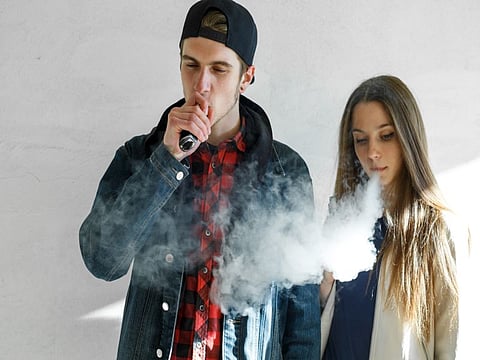THURSDAY, April 22, 2021 (HealthDay News) -- There appears to be a silver lining to forced school and business closures during early weeks of the COVID-19 pandemic, according to a new study: Fewer kids used e-cigarettes.
Compared to the previous quarter, vaping rates fell among 15- to 20-year-olds while widespread stay-at-home orders were in place from March 14 to June 29, 2020, according to an online survey of more than 5,750 teens and young adults.
The main reason for the decline? There was an apparent lack of access to e-cigarettes and other vaping supplies, according to the researchers. Shops were closed or had limited hours, and there weren't parties or after-school hangout sessions where kids could share e-cigarettes.
"The combination of not being able to share, not having access to retail outlets and affordability were significant predictors of drops in vaping," said study author Jennifer Kreslake, research director from the Schroeder Institute at Truth Initiative, a Washington, D.C.-based anti-tobacco group.
While this is good news, it's too soon to celebrate just yet.
Once the United States opens up further, so too will access to e-cigarettes for youth, said study co-author Elizabeth Hair, senior vice president of the Truth Initiative.
"We are concerned that we will see an uptick, and we are monitoring it, especially as kids go back to school and the new normal," she said.
A battle plan that includes public education, community support and policies to restrict teens' access to e-cigarettes is needed to keep up this momentum, Hair added.
The study was recently published in the American Journal of Public Health.
Dr. Melodi Pirzada, chief of the pediatric pulmonary medicine at NYU Langone Hospital–Long Island in Mineola, N.Y., wasn't part of the study, but reviewed the findings. She is also worried about a surge in teen use of e-cigarettes as more of the country opens up.
"Young adults are experiencing tremendous anxiety and depression due to the pandemic -- they lost one to two years of their lives where they couldn't date or meet people," Pirzada said. "They will seek ways of feeling good, and nicotine may help."
E-cigarettes may be safer than traditional cigarettes, but they are far from safe, she pointed out.
"There are at least 50 toxins found to cause cancer in e-cigarettes, and we don't know the long-term effects yet," Pirzada said. In terms of addictive nicotine content, one vaping cartridge is equal to one pack of cigarettes, she added.
Younger users are more likely to become addicted to nicotine, she said, pointing out that nicotine is harmful to the developing adolescent brain.
More work is needed to discourage vaping in young adults, but some progress has been made, Pirzada said.
Cases of serious lung illness associated with a chemical in vaping products containing THC, the psychoactive ingredient in marijuana, have probably made weed vaping "a thing of the past," she said. And last year the U.S. Food and Drug Administration banned the use of flavors that appealed to young people.
Pirzada noted that kids in the new study could have bought e-cigarettes on the internet during lockdown. The lack of an increase in vaping due to online sales suggests that it is more of a social issue for these kids.
Dr. Len Horovitz, a pulmonary specialist with Lenox Hill Hospital in New York City, also reviewed the study, and agreed.
"The opportunity for vaping was limited during the shutdowns," he said. "Kids are not hanging out in the schoolyard so there is no peer pressure to vape."
More information
For more facts on e-cigarettes and their effect on health, see the U.S. Centers for Disease Control and Prevention.
SOURCES: Jennifer Kreslake, MPH, PhD, research director, Truth Initiative Schroeder Institute, Washington, D.C.; Elizabeth Hair, MS, PhD, senior vice president, Truth Initiative, Washington, D.C.; Melodi Pirzada, MD, chief, pediatric pulmonary medicine, NYU Langone Hospital–Long Island, Mineola, N.Y.; Len Horovitz, MD, pulmonary specialist, Lenox Hill Hospital, New York City; American Journal of Public Health, April 15, 2021


